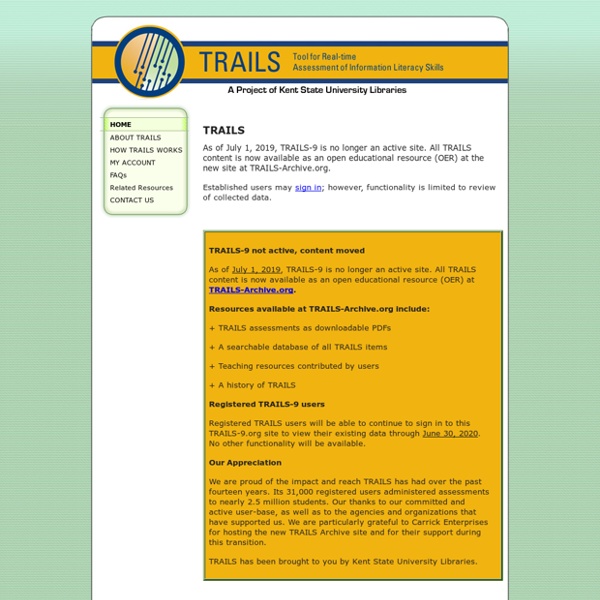



42explore: Thematic Pathfinders for All Ages Top 5 Quiz Generators for Online Educators Top 5 Quiz Generators for Online Educators Building out quizzes for both traditional and online classes can be a time-consuming chore. Luckily, there are now many online "generators" being designed that take much of the work out of online test taking. If you need to create a simple online test, look to the five user-friendly tools below. Exam Builder – With this exam generator, you can create an online test in a Web browser, and then publish it in one click. You can customize each test for online registration and individual retests, plus the site provides an analysis on how your students scored as a whole. Quiz Center – Brought to you by the Discovery Channel, this easy tool will allow you to create, publish and grade quizzes online. Charles Kelly's Online Quiz Generator – This multiple choice test generator is very popular amongst tech-savvy college instructors. The above tools have proven to be very useful and popular amongst online instructors.
The TL Toolkit for Student Success Home Think you don’t? Yes you do! Teacher-librarians can and do make a difference. There is a considerable body of documented evidence that proves that schools having a good school library and program have a positive impact on student achievement. Although the data is mounting globally it is also clear that school administrators need to have evidence at the local school level when planning for school improvement and making tough financial decisions. Look how far we’ve come (already) in Ontario. Evidence-Based Practice is not complicated. Some Benefits of Evidence-Based Practice: Improving and demonstrating student achievement Becoming learning central Empowering the learner and the professional Highlighting the school library’s role in school improvement Providing accountability: funding, staffing, scheduling Planning more effectively Increasing your job satisfaction Reflecting on your practice Moving beyond advocacy
Virtual Information Inquiry: REACTS Stripling and Pitts Research Process Model The late 1980s was a time when many librarians and educators were discussing the importance of information skills. Barbara Stripling and Judy Pitts focused their attention on the need for high level thinking in the research process. It became known as the Stripling and Pitts Research Process Model or REACTS. Read the article Teaching Inquiry with Primary Sources to see REACTS in action. The REACTS Taxonomy developed by Barbara Stripling and Judy Pitts focuses on critical thinking in the research process. The REACTS Taxonomy includes the following elements: Recalling Explaining Analyzing Challenging Transforming Synthesizing Ten Step Research Process Along with the the teaching strategies associated with the REACTS Taxonomy, Stripling and Pitts designed a 10-step process to help students develop their term paper from topic selection to final product. Learn More Brainstorms and Blueprints: Teaching Research as a Thinking Process by Barbara Stripling, and Judy Pitts.
INTJ Profile Introverted iNtuitive Thinking Judgingby Marina Margaret Heiss Profile: INTJ Revision: 3.1 Date of Revision: 17 Oct 2009 To outsiders, INTJs may appear to project an aura of "definiteness", of self-confidence. This self-confidence, sometimes mistaken for simple arrogance by the less decisive, is actually of a very specific rather than a general nature; its source lies in the specialized knowledge systems that most INTJs start building at an early age. When it comes to their own areas of expertise -- and INTJs can have several -- they will be able to tell you almost immediately whether or not they can help you, and if so, how. INTJs are perfectionists, with a seemingly endless capacity for improving upon anything that takes their interest. INTJs are known as the "Systems Builders" of the types, perhaps in part because they possess the unusual trait combination of imagination and reliability. In the broadest terms, what INTJs "do" tends to be what they "know". Introverted iNtuition U.S.
Impact Studies - CISSL The School Library Impact Measure (SLIM) is a toolkit that enables you toassess student learning through guided inquiry in the school library. It consists offour instruments that elicit students’ reflections on their learning at three points intheir inquiry process. The toolkit will enable collaborating school librarian –teacher teams to chart changes in students’ knowledge and experiencesthroughout the process. Inquiry LearningThe school context for using the SLIM toolkit is an inquiry unit. SLIM Handbook SLIM Reflection Instruments and Scoring Guidelines SLIM Scoring Sheet Kuhlthau, C., Heinstrom, J, & Todd, R. Todd, R. Todd.
Library Success: A Best Practices Wiki - Library Success: A Best Practices Wiki Dr. Ross Todd - Library Partnerships: Working Together for Student Success - LibGuides at Bergen Community College Scholarly Journal Articles (Refereed) TODD. R. J. (2012) School Libraries and the Development of Intellectual Agency: Evidence from New Jersey. Presented in the Research Forum of AASL, and to be published in School Library Research TODD, R. TODD, R. TODD, R.J. (2011) “One Common Goal: Student Learning. Hay, L. & TODD, R.J. (2010). Gordon, C.A. & TODD, R.J. (2009). TODD, R.J. (2009). TODD, R.J. (2009). TODD, R.J. (2009). TODD, R.J. (2009). TODD, R.J. (2009). TODD, R.J. (2008). TODD, R.J. (2008). TODD, R.J. (2008). Kuhlthau, C., Heinstrom, J., & TODD, R.J. (2008). TODD, R.J. (2007). TODD, R. (2006). TODD, R. (2006). TODD, R. (2006).
Museums, libraries and archives - learning - Home